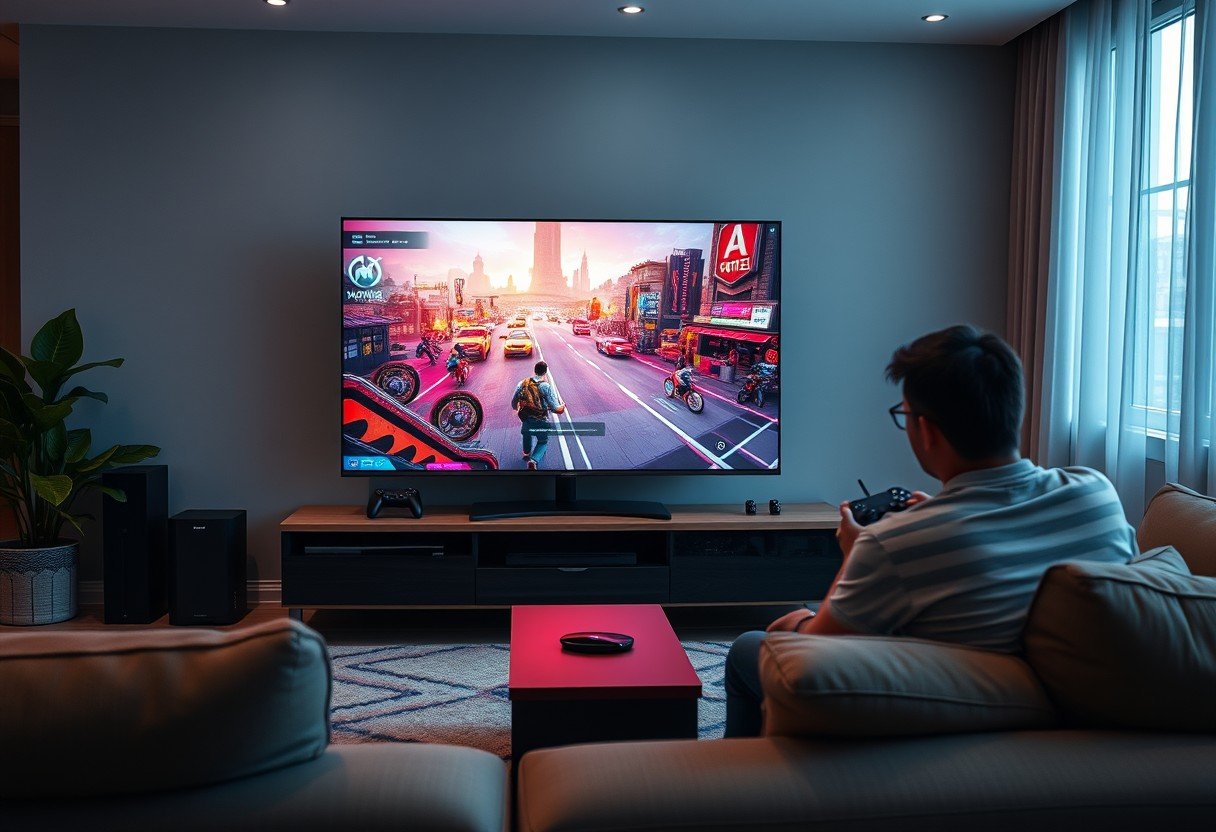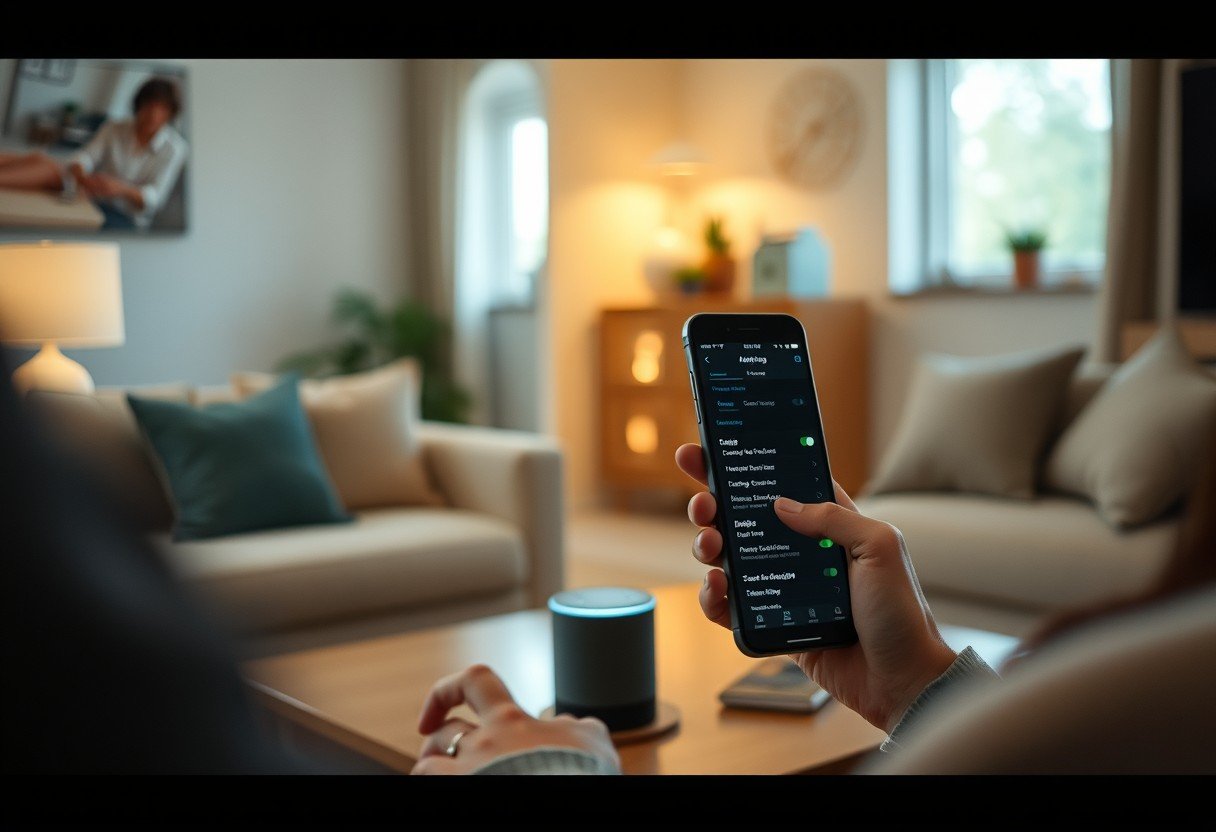Smart TVs have become the centerpiece of modern living rooms, offering streaming apps and internet access right on your big screen. But when it comes to gaming, you might wonder if they can replace a dedicated monitor. The answer depends on your gaming style and the specific TV model, as features like input lag, refresh rate, and a dedicated Game Mode can make or break your experience. Let’s explore if a smart TV is the right choice for your gaming setup.
What Makes a Smart TV Good for Gaming?
Modern smart TVs are not just for watching movies; many are built with gaming in mind. The biggest visual advantage is their support for high resolutions like 4K and High Dynamic Range (HDR). This combination delivers incredibly detailed and vibrant game worlds, making immersive, story-driven games look absolutely stunning.
Many newer models from brands like Samsung, LG, and Sony come with a dedicated Game Mode. When activated, Game Mode turns off extra picture processing to drastically reduce input lag, which is the delay between pressing a button on your controller and seeing the action on screen. This single feature can make a smart TV feel much more responsive and suitable for most types of gaming.
Furthermore, the convenience of an all-in-one entertainment hub cannot be overlooked. You can seamlessly switch from playing on your console to watching a Twitch stream or a YouTube walkthrough, all using the same device and remote.
The Major Drawbacks: Input Lag and Refresh Rate
Despite their strengths, smart TVs often fall short in two critical areas for serious gamers: input lag and refresh rate. Even with Game Mode, some TVs have higher input lag than a dedicated gaming monitor. While a casual gamer might not notice a 30ms delay, a competitive player in a fast-paced shooter will find it frustrating and disadvantageous.
Refresh rate, measured in Hertz (Hz), determines how many times the screen updates per second. While many TVs advertise high “motion rates,” their true or native refresh rate is often only 60Hz. For smooth, fluid gameplay, especially on next-gen consoles like the PlayStation 5 and Xbox Series X, a 120Hz refresh rate is ideal. A lower refresh rate can result in motion blur and a less responsive feel, which is particularly noticeable in racing or fighting games.
These performance issues are the primary reason why many professional and serious gamers still prefer dedicated monitors designed specifically for low latency and high refresh rates.
Connectivity is Key: HDMI 2.1 and Wireless Options
The ports on your TV are crucial for getting the best performance from your gaming hardware. For modern consoles, having an HDMI 2.1 port is a game-changer. This latest standard supports features that are essential for a top-tier gaming experience.
Without HDMI 2.1, you won’t be able to play games in 4K resolution at a 120Hz refresh rate. It also enables other important gaming technologies.
- Variable Refresh Rate (VRR): This feature allows the TV’s refresh rate to sync with the game’s frame rate, which eliminates screen tearing and stuttering for a much smoother picture.
- Auto Low Latency Mode (ALLM): This automatically switches the TV into its Game Mode when it detects a console is being played, so you don’t have to manually change the settings every time.
Wireless connectivity also plays a role. A strong Wi-Fi connection is necessary for cloud gaming services like Xbox Cloud Gaming and for downloading large game files without waiting for hours. Bluetooth support is also handy for connecting wireless controllers or headsets directly to the TV, reducing cable clutter in your setup.
The All-in-One Advantage of a Smart TV
One of the most compelling reasons to use a smart TV for gaming is its role as a centralized entertainment system. You no longer need separate devices for gaming, streaming movies, or listening to music. Everything is accessible from one interface.
This integration simplifies your living room setup significantly. You can finish a gaming session and immediately switch to Netflix or Disney+ with the press of a button. This convenience is a major benefit for casual gamers and families who use the TV for more than just playing games.
The large screen sizes available with smart TVs also offer a more cinematic and immersive experience compared to smaller monitors. Playing epic adventure games on a 65-inch screen can make the game world feel vast and awe-inspiring.
When a Gaming Monitor is a Better Choice
Despite the advancements in smart TVs, dedicated gaming monitors remain the superior choice for competitive and hardcore gamers. Monitors are built from the ground up with one purpose: to provide the fastest and most responsive display possible. They consistently offer lower input lag, often below 5ms, which is critical for games where split-second reactions matter.
Monitors also lead the way in refresh rates, with 144Hz, 240Hz, and even higher options available. This results in exceptionally smooth motion that a TV simply cannot match. If you primarily play fast-paced online multiplayer games like Call of Duty, Fortnite, or Valorant, a high-refresh-rate monitor will give you a clear competitive edge.
Here is a quick comparison of the key differences:
| Feature | Typical Smart TV | Dedicated Gaming Monitor |
|---|---|---|
| Input Lag | 10ms – 40ms (with Game Mode) | 1ms – 10ms |
| Refresh Rate | 60Hz / 120Hz | 144Hz / 240Hz+ |
| Primary Use | General Entertainment | Competitive Gaming |
| Screen Size | Large (43″ and up) | Smaller (24″ – 32″) |
Ultimately, the choice comes down to your priorities. If you value versatility and an immersive visual experience for single-player games, a good smart TV is an excellent option. If your focus is on competitive performance and lightning-fast response times, a gaming monitor is the way to go.
Frequently Asked Questions about Gaming on a Smart TV
What features should I look for in a smart TV for gaming?
Look for a TV with low input lag (under 20ms is great), a native 120Hz refresh rate, and at least one HDMI 2.1 port. Features like Variable Refresh Rate (VRR) and a dedicated Game Mode will also significantly improve your gaming sessions.
Can gaming on a smart TV cause screen burn-in?
While possible, burn-in is much less of a concern on modern TVs, especially LED/LCD models. OLED TVs are more susceptible, but most include features like pixel shifting and screen savers to prevent static images, like a game’s HUD, from damaging the screen.
Are 4K and HDR important for gaming?
Yes, 4K resolution provides sharper, more detailed images, while HDR offers a wider range of colors and better contrast, making games look more realistic and vibrant. To take advantage of these, you need a console or PC that supports them, like the PS5 or Xbox Series X.
Do all smart TVs have a Game Mode?
Most modern smart TVs from major brands include a Game Mode, but its effectiveness can vary. It’s important to research specific models and read reviews to see how well the Game Mode performs in reducing input lag.









Leave a Comment